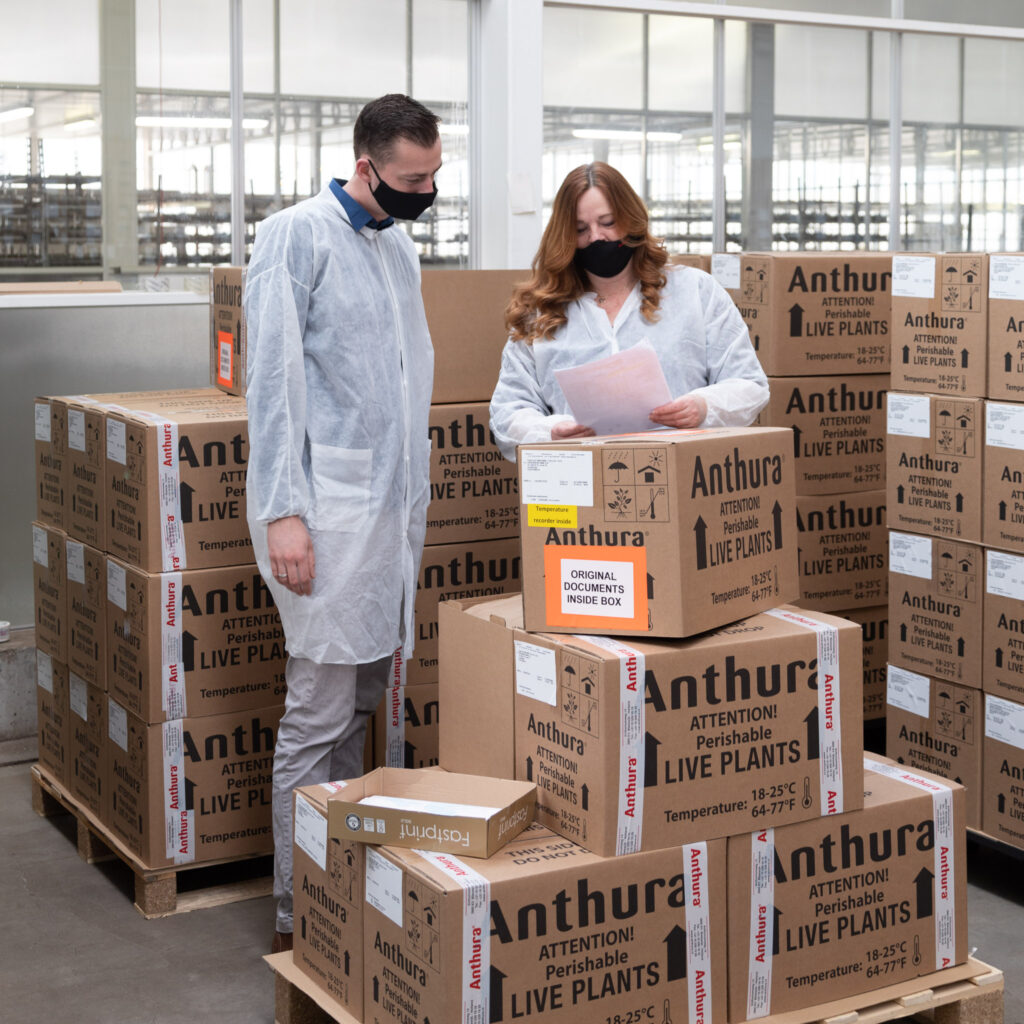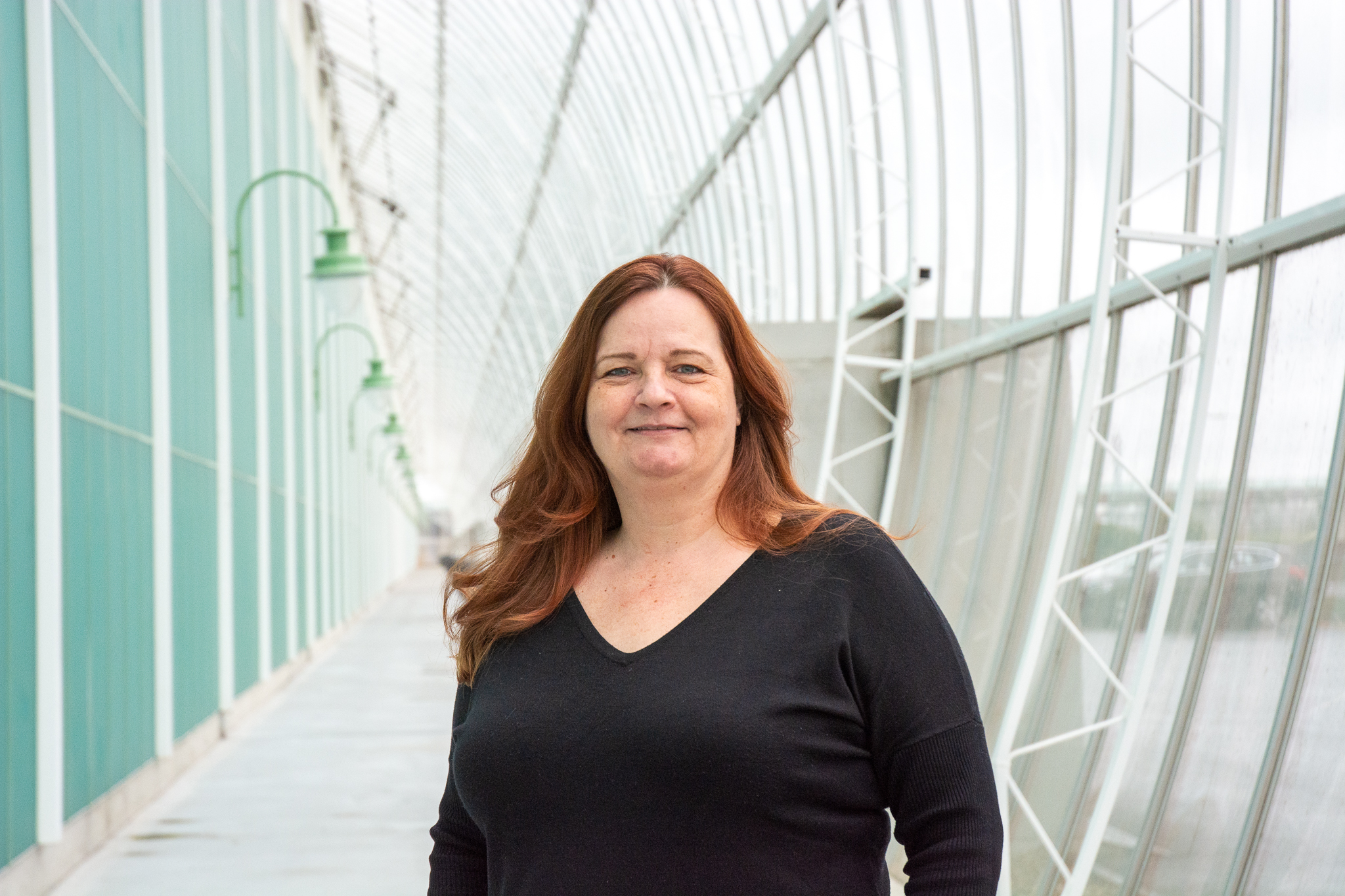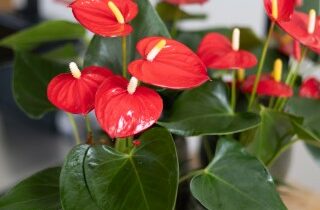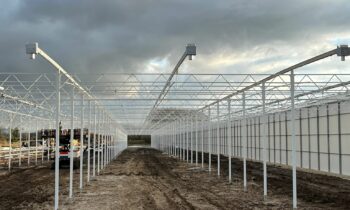Every day tens of thousands of plants are shipped to dozens of countries in and outside Europe. This involves tight planning and organization and good cooperation with organizations such as Naktuinbouw and forwarding agents. A shipment requires the right documents and good coordination, both internally and with the customer. This work takes place in the International Trade and Logistics department, which consists of two employees. We meet Angelique van der Tor and Johan ‘t Hart, who run this department together.
Angelique joined Anthura in 2019. Initially hired for plant variety and trademark law in support of the International Trade and Logistics department, she has been working full time in this department since last year. Johan has reinforced the department since last March.

Can you briefly explain what happens in this department?
Angelique
A brief explanation? That is difficult because so much happens during export… Export is the last link in our internal chain. We ensure that the people on the packing and delivery floor are given the correct instructions. We book the flights and containers for shipments outside the EU and the road transport within the EU, and take care of the correct documents. If necessary, we will arrange for an inspection by Naktuinbouw. We also keep an eye on whether customers have the right import licenses with the right credits, if this is necessary. Customs and damage settlements are also part of our tasks.
Johan
So basically we make sure that every plant going abroad arrives on time, with the right papers, and with the best means of transport. Of course, we also liaise closely with the sales and shipping department. Additionally, it is important that we keep up-to-date with all the import and export regulations

Angelique van der Tor

Johan ‘t Hart
Do you have an agreement on the division of tasks between you?
Johan
It’s actually very simple: together we make sure the shipment gets to the customer in the way the customer prefers. With all the additional work involved.
Angelique
I agree. For me, ‘CITES’ (Convention on International Trade in Endangered Species of Wild Fauna and Flora) is a hot topic. This is a permit for the import and export of, among other things, endangered plants, including Phalaenopsis. This must be in place for a shipment to be sent or received.
What makes your work fun?
Angelique
I can be brief about this: no day is the same and you must be as flexible as a contortionist. The work involves challenges, variety and inventiveness. Something always happens that makes you look for a solution to get the plants to the customer on time.
In the past year in particular there have been many challenges. In the last few months this has mainly concerned booking the flights. There was, of course, limited flight availability due to the coronavirus pandemic.
Johan
Every day is different indeed. You can plan the day in advance, but there is always something else that comes up. Sometimes you have to drop everything you’re working on because of high-priority issues, such as a flight being cancelled, problems with customs clearance in the destination country, or a report of shipping damage. Often things that happen are beyond our control, but whenever we can, we help to solve the problem.
The trick is to complement each order to the best of your ability, preparing things to be as efficient as possible while leaving a professional impression with the customer. I also get a lot of energy from contacts with various internal departments, customers, transporters and the inspection department

Can you give an example of a challenge where you had to pull out all the stops?
Angelique
Earlier this year, an export shipment by boat was planned to Guatemala. Due to the shortage of containers because of COVID-19, we could only book a ship that would arrive in Guatemala around Easter. Because of this holiday, nobody was working in Guatemala and the shipment would be stuck there for a week. The client, quite rightly, was unhappy and wanted to receive his plants before Easter.
We then started to look at the possibilities to offer the client a solution. In this case, the only option was to send the shipment by air. The transport costs of a shipment by airplane compared to a boat are a lot higher, so we had to discuss this with the client. He was willing to pay these extra costs. An advantage of a shipment by air is that it reaches its destination much faster. Problem solved, you might think… that was the case for the client, but internally we had to do quite a bit of organizing. All the plants had to be repacked into air cargo boxes and the shipment contained over 70,000 plants.
After consulting with our colleagues who pack these shipments and with the shipping department, we set to work. The plants were already here in sea freight boxes from Germany and had already been inspected. A number of colleagues had to work overtime to get everything done on time. We had pizzas delivered and everything was repacked the same day, so the shipment could be taken to Schiphol the next day. Internal cooperation and flexibility made this possible, and that gives me a feeling of satisfaction. And most importantly, the client was also very happy with the solution.
What are you most proud of?
Johan
If, on a Friday afternoon, all the shipments are on their way to the customer with the right papers.
Angelique
And when it turns out on Monday that everything has been cleared and has been received by the customer in a good condition… I am also proud that despite Brexit and the associated changes, we have found a way to send a shipment to our English customer Double H every week.
Because we are the final piece in the organization, everything prior to our work is very important. If the shipments can leave as planned, it means the rest of the organization did a good job. And in fact, that is always the case. Problems and delays almost always have an external cause. Everyone needs each other and has the willingness to help in order to ultimately have a satisfied customer. That makes us happy and we are certainly proud of it.







